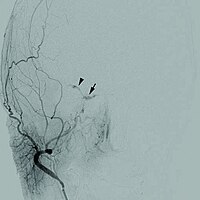
Photo from wikipedia
We have previously reported that the long-term exposure of Isocarbophos, a kind of organophosphorus compounds, induces vascular dementia (VD) in rats. Studies have also shown that organophosphorus compounds have adverse… Click to show full abstract
We have previously reported that the long-term exposure of Isocarbophos, a kind of organophosphorus compounds, induces vascular dementia (VD) in rats. Studies have also shown that organophosphorus compounds have adverse effects on offsprings. Vitamin B6 is a coenzyme mainly involved in the regulation of metabolism and has been demonstrated to ameliorate VD. Sphingosine-1-phosphate (S1P), a biologically active lipid, plays a vital role in the cardiovascular system. However, whether S1P is involved in the therapeutic effects of Vitamin B6 on posterior cerebral artery injury has yet to be further answered. In the present study, we aimed to explore the potential influence of Vitamin B6 on Isocarbophos-induced posterior cerebral artery injury in offspring rats and the role of the S1P receptor in this process. We found that Vitamin B6 significantly improves the vasoconstriction function of the posterior cerebral artery in rats induced by Isocarbophos by the blood gas analysis and endothelium-dependent relaxation function assay. We further demonstrated that Vitamin B6 alleviates the Isocarbophos-induced elevation of ICAM-1, VCAM-1, IL-1, and IL-6 by using the enzyme-linked immunosorbent assay kits. By performing immunofluorescence and the western blot assay, we revealed that Vitamin B6 prevents the down-regulation of S1P in posterior cerebral artery injury. It is worth noting that Fingolimod, the S1P inhibitor, significantly inhibits the Vitamin B6-induced up-regulation of S1P in posterior cerebral artery injury. Collectively, our data indicate that Vitamin B6 may be a novel drug for the treatment of posterior cerebral artery injury and that S1P may be a drug target for its treatment.
Journal Title: Acta biochimica et biophysica Sinica
Year Published: 2021
Link to full text (if available)
Share on Social Media: Sign Up to like & get
recommendations!